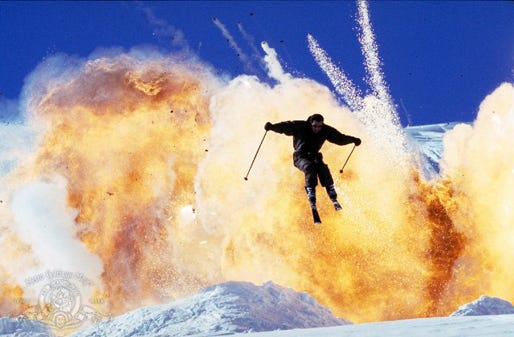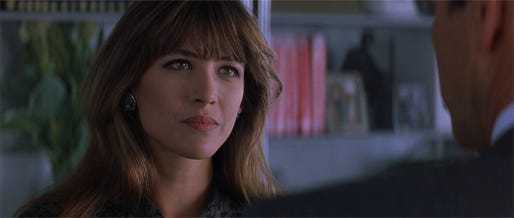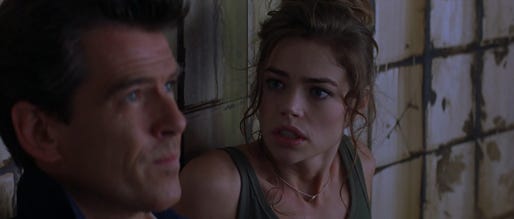You Only Live Twenty-Thrice: "The World is Not Enough"
“You Only Live Twenty-Thrice” is a look back at the James Bond films.
Each Friday until the release of the 23rd official Bond film, “Skyfall,” we will revisit its 22 official predecessors from start to finish, with a bonus post for the unofficial films in which James Bond also appears.
There are many people to blame for “The World is Not Enough.” But the main culprit is a rival secret agent — one who fears only nuclear war and carnies, drinks Captain Morgan and Tab, and boasts phallic-shaped whorls of chest hair.
Yes, the Austin Powers series sends up only the 007 films that came 24 years (or more) before Pierce Brosnan even took the part. And in 1997, Brosnan actually headlined two films (remember “Dante’s Peak”?) that earned more than “Austin Powers: International Man of Mystery.”
But by Brosnan’s third go-round in 1999, Mike Myers’ silly satire had exploded from comedy curio to blockbuster behemoth. “International” raked in millions on the VHS market in 1998, propelling its 1999 summer sequel, “The Spy Who Shagged Me,” beyond the $200-million mark at the box office.
Worst of all, Austin Powers’ success seemed to make the Broccolis gun shy about letting their next Bond film have any fun at all, lest it be mentally lumped together with Myers’ aggressively bawdy parody. The unfortunate result is a sterile and shockingly sluggish adventure smothered by halfhearted attempts at suspense; after “Moonraker,” it’s hands-down the worst Bond movie of all.
Brosnan makes “Yeeeeeeargh” noises thanks to Bond’s clavicle injury and exceeds minimum effort only fleetingly. By putting the best action scene before the credits, “World’s” wad is blown early. The convoluted narrative wastes the potential of a villain who, on paper, seems like Bond’s greatest physical challenge. “Die Another Day” has more satisfying comic twists than the dramatic one on which “World’s” entire plot hinges. And in an unintentional nod to the “Powers” films, it casts an actress more inanely robotic than any Fembot as a Bond girl.
“World” announces its stultifying intentions from the get-go with what would have been, in its original form, the most pitiful pre-credits sequence yet.
Bond is in Spain to retrieve money stolen from Sir Robert King, a British oil tycoon and longtime friend of M (Judi Dench), which has wound up in a Swiss banker’s hands. He’s cleaning up for 0012, killed by an assassin before he could deliver the money to MI6. But before the banker gives up the killer’s name, his own duplicitous assistant (Maria Grazia Cucinotta) shoots him, and Bond is saved in the chaos by long-range sniper fire that thwumps through the windows.
In the end, Bond escapes with the money, descending a few stories by rope to the pavement below. To a data-entry clerk, dentist or actuary, falling a few stories might be enough thrills for a lifetime. But James Bond bravely exits planes without chutes, dangles from national landmarks, jumps from skyscrapers, skydives from mountaintops.
This is play-place ball-pit territory for Bond, and it’s clear this sequence was initially intended as a “dazzler” before a segue into the opening credits. So was born what remains the longest pre-credits sequence of any Bond film — coming in at 14 minutes — and the bad idea to shorten the one compelling action setpiece the movie can muster.
Bond brings the money back to MI6, a safe haven in which to crack painfully dated political jokes about knowing where to put a cigar. But the cash has been rigged with an explosive fertilizer, unknowingly triggered by chemical residue on Sir Robert’s lapel pin.
For the first time, villains have hit Bond right where he lives, and this aggression will not stand. Spying the banker’s assistant on a boat through the freshly blown hole in MI6 headquarters, Bond gives chase on the Thames — in a rocket-powered boat that slingshots around the river like a light, errant kite.
This steeplechase with boats revisits the “Live and Let Die” chase, only urbanized and adrenalized as Bond and his quarry slingshot over, around (and sometimes through) numerous obstacles. Plus, 007 is defending the violation of MI6’s sacred space, and the foamy spray attacking Brosnan’s face accentuates his dogged determination. (Bumped up as it was in the movie, the sequence was somewhat shortened; the extended sequence is what’s below.)
Garbage’s irresistibly seductive sales pitch for world domination awaits in the opening credits. Amid swooping harps and gunshot snare-drum snaps, singer Shirley Manson’s torch-song delivery glides the number into the dangerous and grandiose. There’s an urgency and mystery to composer David Arnold’s musically unresolved conclusion, and longtime Bond-theme lyricist Don Black’s chorus feels ever more skillful in hindsight when you consider it Elektra’s pitch to Renard:
The world is not enough, but it is such a perfect place to start, my love. And if you’re strong enough, together we can take the world apart, my love.
Now, we’ve not yet met Renard or Elektra. But we’ll soon know them as potentially fascinating Bond characters that, by the end, elicit only an all-time sigh. Honestly, the song, in four minutes, creates a connection the 127-minute movie cannot. A KGB agent turned environmental terrorist, Renard is targeting Sir Robert’s oil interests. And what hasn’t killed him is making him stronger. MI6 left a bullet embedded in this anarchist’s head that is slowly and surely ending his life, but endowing him with superhuman pain tolerance as it pushes deeper into his brain.
Renard is a baldpate with rheumy, scarred eyes that feel like a brutal-bloke variation on Donald Pleasance's appearance in “You Only Live Twice.” And he’s played by Robert Carlyle, the frighteningly hair-triggered Begbie in “Trainspotting” and a sweet steel worker-cum-stripper a year later in “The Full Monty.”
Elektra (Sophie Marceau) is the woman Renard famously kidnapped once before — Sir Robert’s daughter and heiress to an oil empire he assumed control of upon marriage. Her life came at the cost of her innocence, as she used sex to lull Renard into a false sense of security and got away after taking control of a firearm. And with Sir Robert’s assassination, MI6 has every reason to believe Renard is coming for her again.
There could hardly be a more metaphorically rich set-up for Bond and Renard’s battle — a villain who feels no pain colliding with a hero in noticeable agony from the get-go after slamming his collar bone into the Millennium Dome. And Elektra could be a fascinating, psychologically complex Bond beauty — emboldened to independence almost to a fault by the way she survived the violence that surrounded her, using her body and bullets in much the same way Bond does.
Ah, but those are keen, nigh instantaneous suspicions you have about the circumstances surrounding Elektra’s escape and her devil-may-care demeanor, especially when you consider her Greek namesake had little love lost for a parent.
And Renard? Well, that depends on how badass you think it is to watch him hold a scalding rock and do little else. Not once is his capacity for pain truly tested; in fact, of all things, he flinches when Bond punches his face. Turns out he’s a big ol’ wuss for love, with all of Bane’s broken heart and none of his demonstrable brawn.
That’s because — dun, dun, duhhhhhhhhhn — Renard is now doing Elektra’s bidding and was her regular lover before the injury dulled his senses. It seems Elektra never got over dad elbowing mom out of the oil business. And she really didn’t like him using her as bait to flush out Renard. MI6 believed Sir Robert’s motives to be pure; Elektra sees them as complicit foes to be felled along with her other competitors.
There’s one brief bright spot to what is, plain and simple, a bait-and-switch on Renard. It lets Carlyle fling atypically tough talk for a Bond movie — “How does it feel knowing I broke her in for you?” — and showcase his range. “He … he was a good lover?,” Renard asks Elektra of Bond, his voice slightly trembling over pleasures he can only remember and never revisit. It’s all the more reason for him to be jealous of Bond … and attack him with a fiery, unquenchable bloodlust that we never see. They exchange the most cursory of blows on a sinking submarine in the finale — as anticlimactic as anything else the film has to offer.
As for Elektra, she betrays both Bond (to whom she’s become a lover) and M (for whom she’s a surrogate daughter). As producer Barbara Broccoli has said, “Bond thinks he’s found Tracy, but he’s really found Blofeld.” She’s referring to the great love and louse of 007’s life — the latter a woman he married, the former her murderer on the same day.
However, Marceau seemed more palpably upset about losing her dog in the same year’s “Lost and Found” than she is persuasively enraged here to pursue global destruction. (Her plan: Detonate a nuke in Istanbul to make her newly constructed pipeline the only game in town for “the bright, starry, oil-driven future of the West” and drive up her profits.)
That’s partially because the narrative is so convoluted — even straining to bring back Robbie Coltrane’s Russian gangster Zukovsky, introduced in “GoldenEye” — and sketchily fills in her history. But it’s mainly because Marceau is wispy and insubstantial both as a lover and a foe. She lacks the intimate conviction of a woman for whom Bond would truly let his guard down, the enigmatic affectations to play up the suspense surrounding her motivations, and the sadistic edge of villainy once her plot is revealed.
The third act finds Bond in Elektra’s garrote chair, its knobs and notches slowly and painfully twisting his spine. And you can sense the filmmakers similarly attempting ratchet up the tragedy and tension: To make it out of this mission alive, Bond will have to kill a woman whom he allegedly loved with more than his body.
To Brosnan’s credit, he at least tries to convey that Bond’s instincts may be at cross-purposes. But if the filmmakers wanted true resonance — a part of his soul dying when he puts a bullet in her head — well, we’d need to be convinced he’d have uttered three little words only George Lazenby and Daniel Craig have gotten to say.
They would have also had to cancel Christmas — as in Dr. Christmas Jones, a nuclear physicist at an ICBM base from which Renard steals a missile.
Admittedly, “Denise Richards” and “doctoral intellect” probably aren’t two great tastes that taste great together. But when the material and direction are right, as they were for her in “Drop Dead Gorgeous” and “Undercover Brother,” Richards is fine with light, frothy stuff. Here, you’re scanning background extras to see if one is operating her via remote control and wondering which circuits are misfiring.
Worst of all, the script turns Richards into an exposition machine — asking her to shout her dialogue about science in hopes it will somehow make her seem authoritative. In the end, she’s just the world’s loudest, bustiest physics tutor.
So, what about the action? Well, aside from the boat chase, director Michael Apted seems largely disinterested in that … or at least making it seem anything more than an obligation. Or, really, anything other than James Bond vs. some sort of helicopter.
Bond goes skiing again for the first time in 14 years, only to be interrupted by “parahawk” aircrafts — with which he engages in ho-hum combat before surviving an avalanche. (At least the second-unit photography of the French peaks standing in for the Caucasus Mountains is phenomenally pristine.) And in a bit cut from “GoldenEye” but revived here, Bond survives a swinging helicopter scythe. It’s rather convenient how this pilot just waits for Bond to fire upon him.
For a moment, though, “World” is undeniably, unforgettably classed up one last time by Desmond Llewelyn, in his final appearance as Geoffrey Boothroyd, aka “Q.”
Llewelyn planned to play Q “as long as the producers want me and the Almighty doesn’t,” but the 85-year-old actor died in a car crash mere weeks after “World’s” release. Given the introduction of John Cleese as his bumbling protégé, the producers clearly had a contingency plan in place. And even though it wasn’t an intentional sendoff, Llewelyn’s final moments here blend finality with frivolity.
The look on Llewelyn’s face suggests a conclusive farewell, the elevation of his brow speaks to what he has known, and we have known, over 36 years of the character: When it comes to the cool factor, there is no James Bond without Q.
Next week: "Die Another Day"
BULLET POINTS
The movie takes its title from the English translation of the Latin Orbis non-sufficit. It’s the real-life family motto of Sir Thomas Bond, a 17th-century British Baronet and, as revealed in “On Her Majesty’s Secret Service,” the motto of James Bond’s family — supposed descendants of Thomas.
Joe Dante — director of “The Howling,” “Gremlins” and “Innerspace” — was approached to direct. So was Peter Jackson. However, after Broccoli screened “The Frighteners” — Jackson’s underrated, ill-fated first Hollywood film — she lost interest.
“The World is Not Enough” was to have, per the four previous Bond films, a second, end-credits song. However, director Michael Apted discarded British crooner Scott Walker’s “Only Myself to Blame” and used a remix of “The James Bond Theme.” A wise choice, as the movie was sleepy enough before Walker’s standard-issue torch-song croon. However, in Japan, “Sweetest Coma Again” — by that nation’s answer to Muse, Luna Sea — was used over the end credits.
The Bond films only have one more Oscar than they do a Golden Raspberry. Denise Richards won a 1999 Razzie, honoring the year’s worst in film, for Worst Supporting Actress. Richards and Pierce Brosnan were also nominated for Worst Screen Couple.
Q’s boat used in the pre-credits chase has a top speed of 80 miles an hour — more than 8 times the legal limit on the Thames, which caused the sequence’s filming to take seven weeks. Also, its 350 horsepower engine could force the bow of the boat under water, and this circumstance was written into the movie.






